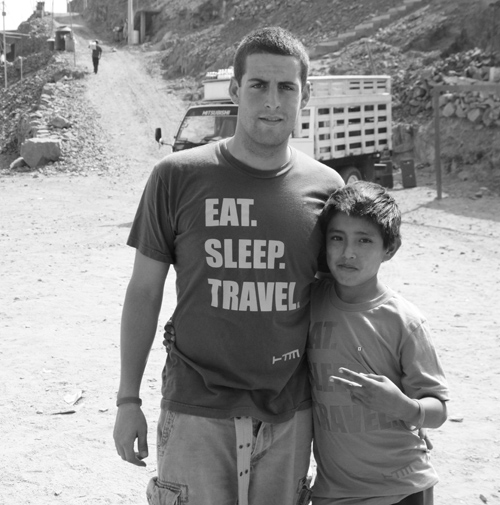
The accident that paralyzed U of G student Drew Cumpson from the neck down last year didn’t affect his ability to smile, which he does often. He credits his positive attitude and the support of his friends and family for keeping him going.
“I do plan to return to school,” says the second-year hotel and food administration student. “I plan to take one or two courses online in the fall.” He hopes to finish his degree in the next few years and then focus on the hospitality and tourism industry, which will be required to meet wheelchair-accessibility provisions under the Accessibility for Ontarians with Disabilities Act by 2025.
It comes as no surprise to his friends and family that he’s not only determined to go back to school but also to help others with disabilities. “I’d like to do a project on disability,” says Cumpson, adding that he wants to help the hospitality and tourism industry become more accessible.
On the last day of a two-week volunteer trip to Peru in May 2011, Cumpson was body surfing in the ocean when a large wave threw him against the sea floor. As a former lifeguard, he knew instantly that he had suffered a spinal cord injury. Several U of G students witnessed the accident; two of them pulled him out of the water and began performing CPR.
Cumpson was rushed to a Peruvian medical clinic and then taken to a nearby hospital, where an MRI revealed that he had injured the fourth cervical vertebra in his spine.
After spending five days in the Peruvian hospital, he was airlifted to Kingston General Hospital in Kingston, Ont., where doctors waited several weeks for his condition to stabilize before performing surgery to repair the fractured vertebra and insert a tracheotomy to help him breathe. As Cumpson spoke from his hospital bed during a Skype interview earlier this month, his ventilator began beeping. “It’s from talking too much,” he says. “I’m letting too much air out.”
What advice would he give to people living with spinal cord injuries? “I think the biggest thing is to be very accepting of the injury and not allowing yourself to be overcome by what’s happening to you.”

Since his accident, Cumpson has endured many complications, including peritonitis, an inflammation of the lining of his abdomen. A feeding tube leakage caused toxins to form in his abdomen, so he underwent surgery to insert five abdominal drains last summer.
The accident also caused his lungs to fill with ocean water, resulting in respiratory complications. His doctors had to insert numerous chest tubes due to the holes in his lungs that caused air to collect between the surface of his lungs and chest wall, a condition known as a pneumothorax.
After being put back on a feeding tube, a second bout of peritonitis occurred, resulting in Cumpson undergoing two more surgeries in the past six weeks.
He recently developed a hematoma on the right side of his abdomen. The large blood clot restricted the flow of stomach contents into his intestines. He’s now on a liquid diet and occasionally receives small amounts of solid food to see how it affects his digestive tract. Vomiting and aspiration can cause serious problems with his tracheotomy. As part of his rehabilitation, he undergoes physiotherapy for 30 to 45 minutes per day to keep his joints flexible.
Cumpson’s friends and family have been supportive throughout his ordeal. His mother, Heather, has been by his side ever since the accident happened. Six of his friends, including three that were with him on the trip, were in his hospital room during this interview. To them, the accident hasn’t changed him as a person; he’s still their friend.
When asked what took them all the way to Kingston from Guelph, Erin Glaysher, a fourth-year marketing student, replied: “Because it’s Drew and we miss him.” Brittany McGregor, a third-year kinesiology student who has known Cumpson since childhood, added: “Hanging out with him is just normal, like you would with any friend.”
Even strangers have offered their support, both financially and with words of encouragement on his “Our Drew” Facebook page, which has more than 700 members. “It keeps me positive,” says Cumpson. “Having their support means I’ve had an impact on their lives.”
In January, the Hospitality and Tourism Management Student Association organized a fundraiser that raised more than $32,000 to help cover Cumpson’s expenses. His wheelchair will cost about $40,000, and his rehabilitation will cost about $1,600 per month. Donations can be sent to Drew Cumpson In Trust, 53A Bessey Lane, Tichborne, Ont., K0H 2V0.
“I’d like to thank everyone for the support that’s come in,” says Cumpson, “and thank everyone at the University for helping me continue my schooling.”